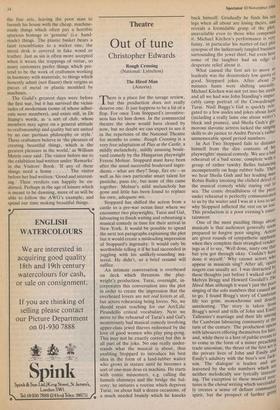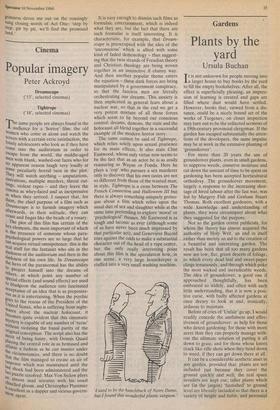Theatre
Out of tune
Christopher Edwards
Rough Crossing (National: Lyttelton) The Hired Man (Astoria) rr here is a place for the savage review,
but this production does not really deserve one. It just happens to be a bit of a flop. For once Tom Stoppard's inventive- ness has let him down. In the commercial theatre the show would have closed by now, but no doubt we can expect to see it in the repertoire of the National Theatre for months to come. Rough Crossing is a very free adaptation of Play at the Castle, a mildly melancholy, mildly amusing boule- vard comedy by the Hungarian playwright Ferenc Molnar. Stoppard must have been after the usual successful boulevard ingre- dients — what are they? Snap, fizz etc — as well as his own particular smart talent for pastiche, puns etc, but none of this came together. Molnar's mild melancholy has gone and little has been found to replace his own, adequate wit.
Stoppard has shifted the action from a castle to a pre-war ocean liner where we encounter two playwrights, Turai and Gal, labouring to finish writing and rehearsing a musical comedy in time for their arrival in New York. It would be possible to spend the next ten paragraphs explaining the plot but it would create a misleading impression of Stoppard's ingenuity. It would only be worthwhile telling it if he had succeeded in juggling with his unlikely-sounding ma- terial. He didn't, so a brief resume will suffice.
An intimate conversation is overheard on deck which threatens the play- wright's production. Turai, overnight, in- corporates this conversation into the plot in order to create the impression that the overheard lovers are not real lovers at all, but actors rehearsing being lovers. No, we should resist reaching for our Art/Life/ Pirandello critical vocabulary. Next we move to the rehearsal of Turai's and Gal's monstrously bad musical comedy involving upper-class jewel thieves redeemed by the love of good women who play ping-pong. This may not be exactly correct but this is all part of the joke. No one really under- stands what the musical is about, thus enabling Stoppard to introduce his best idea in the form of a land-lubber waiter who grows in stature until he becomes a sort of one-man deus ex machina. He starts with comic misnomers, e.g. calling the funnels chimneys and the bridge the bal- cony; he initiates a routine which deprives Turai, on about half a dozen occasions, of a much needed brahdy which he knocks
back himself. Gradually he finds his sea legs when all about are losing theirs, and reveals a formidable grasp of the plot, unavailable even to those who composed it. Michael Kitchen's performance is verY funny, in particular his matter-of-fact plot synopsis of the ludicrously tangled business surrounding the jewel thief, but even here some of the laughter had an edge of desperate relief about it.
What caused the first act to move so leadenly was the disastrofisly low quota of good, Stoppard jokes. After about 20 minutes hams were shifting uneasily, Michael Kitchen was not yet into his stride and all we had was John Standing's imPec- cably camp portrait of the Cowardesque Turai. Niall Buggy's Gal is quickly rele- gated to a few asides and jokes about food (including a really lame one about writer's block and prunes), and Sheila Gish's gla- morous slavonic actress lacked the singing skills to do justice to Andre Previn's rather unmemorable spoof period numbers. In Act Two Stoppard fails to distance himself from the dire contents of hi5 playwrights' musical comedy. We see a bad rehearsal of a' bad scene, complete with a group of rather tawdry Belles balaneing incompetently on huge rubber balls. Then we hear Sheila Gish and her leading nlan, Robin Bailey intoning the cliched drivel ot the musical comedy while staring out to sea. The comic dreadfulness of the Piece, under rehearsal is perfectly communicate() to us by the waiter and I was at a loss to see why Stoppard inflicted the rest on us to°. This production is a poor evening's enter' tainment. One of the most puzzling things about musicals is that audiences generally see° prepared to forgive poor singing. Actors are given rounds of sympathetic applause when they complete their strangled render' ings as if to say, 'Well done, nasty one that but you got through okay. Couldn't have done it myself.' Why cannot actors who appear in musicals sing? After all, opera singers can usually act. I was distracted bY, these thoughts just before I walked out 01 Melvyn Bragg and Howard Goodall's 71i Hired Man although it wasn't just the poor singing of the solo numbers that caused Me to go. I found Bragg's story of Cumbrian! life too grim, monochrome and dourly unrelenting. The story is taken fOrli Bragg's novel and tells of John and Etna Tallentire's marriage and their life arnong the Cumbrian labouring community at the turn of the century. The production opens with labourers offering themselves for hire, and, while there is a hint of public events to to come in the form of a miner preachill,g trade unionism, the thrust of the first act the private lives of John and Emily Emily's adultery with the boss's son Jac"- son. The dialogue is leaden and on: leavened by the solo numbers which al' neither melodically nor lyrically interest- ing. The exception to these musical st tures is the choral writing which succesSfol" ly creates a sense of defiant communitY spirit, but the prospect of further grittY
grimness drove me out on the rousingly sung closing words of Act One: 'step by
steP, pit by pit, we'll find the promised land.















































 Previous page
Previous page